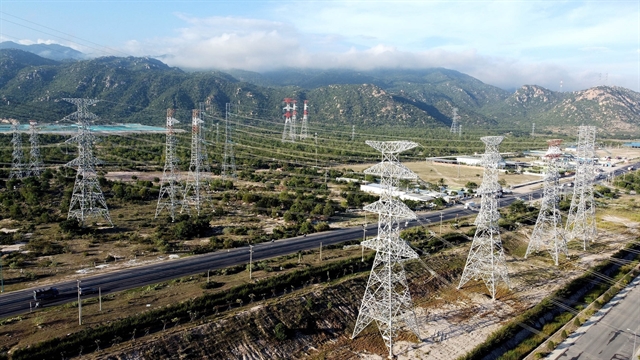There is large potential for the bilateral cooperation in energy which will be unlocked by the Just Energy Transition Partnership (JETP) between Việt Nam and the International Partners Group (IPG), including the UK, on December 14, 2022, and the bilateral trade agreement between the two countries (UKVFTA) and the UK accession to the Comprehensive and Progressive Trans-Pacific Partnership (CPTPP).

Energy will be a major pillar of cooperation between Việt Nam and the UK during the journey to a carbon neutral future, Tạ Hoàng Linh, director of the European – American Markets Department under the Ministry of Industry and Trade (MoIT) said.
There is large potential for bilateral cooperation in energy, which will be unlocked by the Just Energy Transition Partnership (JETP) between Việt Nam and the International Partners Group (IPG), including the UK, on December 14, 2022, and the bilateral trade agreement between the two countries (UKVFTA) and the UK accession to the Comprehensive and Progressive Trans-Pacific Partnership (CPTPP).
In particular, Việt Nam approved the long-waited the National Power Development Plan VIII (PDP8), which sets the goal of increasing the proportion of renewable energy and opens the door for private and foreign investments in the energy sector, Linh said.
Fostering international cooperation is important for Việt Nam to achieve the ambitious goal, he said at a recent UK-Việt Nam Business Forum, adding that the MoIT expects to continue to receive cooperation from the UK towards the net-zero goal.
He stressed that the Vietnamese Government pledged to create favourable and transparent investment environment for investors, including British investors, to access resources and investment opportunities for efficient and sustainable operation in Việt Nam, contributing to leverage ties between the two countries.
Tăng Thế Hùng, deputy director of the MoIT’s Energy Efficiency and Sustainable Development Department, said the energy sector of Việt Nam, which accounted for 80 per cent of the country’s emissions, was under significant pressure for a transition to achieve the net-zero goal.
Energy transition becomes a must for Việt Nam to meet the increasing power demand for socio-economic development, ensure energy security and reduce emissions.
In the carbon neutral journey, besides Việt Nam’s determination and efforts, the country needs substantive support from the international community, especially from developed economies like the UK, Hùng said.
According to Mark George, Climate Counselor, the UK Embassy in Việt Nam, as JETP is something that “we all have to do together”, the UK as a co-chair of IPG has been working very hard with the Government of Việt Nam to take forward the partnership.
Việt Nam is drafting a JETP resource mobilisation plan (RMP), which is very important because the plan will translate the political declaration into a more practical process. The plan will sets out criteria that will be used to utilise the US$15.5 billion finance which has been pledged by the IPG under JETP.
The finance will be poured into the grid to deal with the issues of transmission and integration of renewable energy and key renewable energy investments, he said.
Việt Nam launched PDP8 a few months ago, demonstrating the country’s ambition to shift towards renewable energy. “JETP is there to help the implementation of PDP8. It’s all about implementation afterwards,” he said.
“The UK is committed to continuing to work on JETP to do whatever we can to support different ministries that are involved in the implementation,” he said, adding that the UK is willing to work more directly with the MoIT on JETP issues.

According to Denzel Eades, Vice Chairman of the British Chamber of Commerce in Việt Nam, it is critical to facilitate investments in energy transition and renewable energy to achieve net-zero ambition.
He pointed out that investors and financing parties like predictability, which will ensure that they are able to make long-term investments.
Việt Nam’s policies have been very good at encouraging confidence in the market because the policy, the planning and the legal framework are predictable, Eades said.
Especially with PDP8, which provides a solid foundation for investment in energy sector, there is increasing interest in Việt Nam’s energy market.
Under PDP8, the proportion of renewable energy will be increased from 30 per cent in 2030 to 65 per cent in 2054. “The energy transition is real. JETP becomes so important to Việt Nam’s energy transition because it will help mobilise both public and private financing to facilitate international investment into the energy sector of Việt Nam,” Eades stressed.
“JETP will go hand in hand with PDP8 to create a framework for investment into Việt Nam’s renewable energy sector.”
Investors now look forward to the identification of specific projects under PDP8 for investment opportunities, he said. Investors also look forward to further insight with respect to how the JETP can be catalytic to support private sector investments in the energy sector.
The CPTPP and UKVFTA are also useful tools because energy isn’t just about the technology and the projects but also about the services. “The opportunity for the provision of expertise from the UK through financing, engineering and consultancy is really huge during Việt Nam’s energy transition process.”
Nguyễn Đức Cường, senior officer of T&T Group, which is investing in renewable energy and aims to have a total capacity of 10-15GW by 2035, said international cooperation, including experience sharing and attracting investments, is critical for Việt Nam to accelerate the energy transition and achieve the net-zero target.
The cooperation opportunity with the UK, which has a lot of experience in green transition, is huge, Cường said.
He proposed that the two countries found a research centre which would set new mechanisms for cooperation and resource mobilisation for energy transition. — VNS
|
Highlights of PDP8 toward net-zero goal
|





